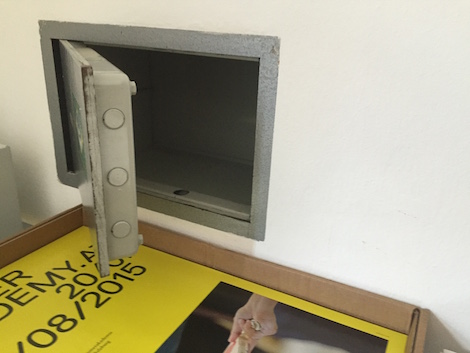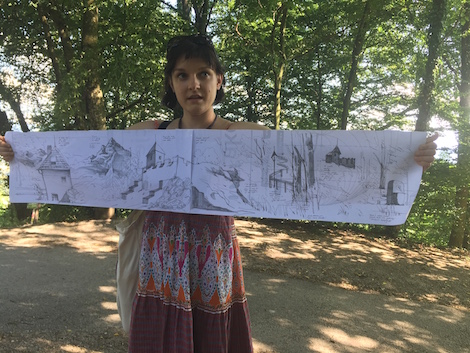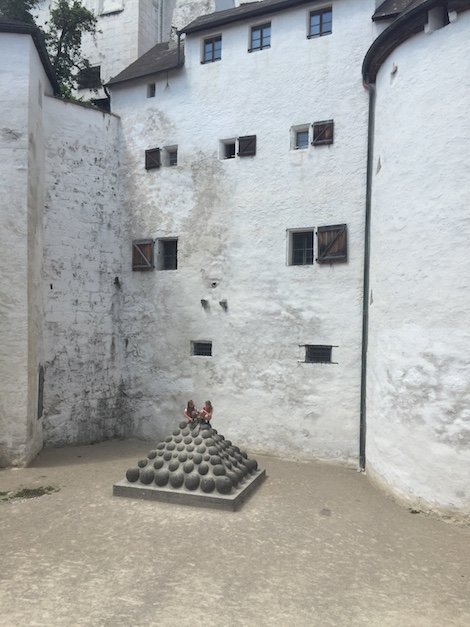| « 3 / 30 Political Syndromes | 1 / 30 Anticipations » |
2 / 30 Revelations
The heat of the day does not let go of Salzburg at night. The streets and buildings emanate it and in my street everybody sleeps with open windows. I am sitting on the sill of my open window, too, and listen to the interview that I have recorded this afternoon. The voice of Ben Katchor fills the room from my laptop speakers. I wanted to talk with him about his experience as a teacher and his role as a comic artist and performer in the contemporary art world. As I revisit and transcribe our conversation, I realize that it subtly addressed something much broader: the question of how to create something. Once you interrogate material long enough, it reveals these other questions.
Tell me about your experience as a teacher. How is it for you to teach?
The first eight years when I taught part time, I tried to make up pure exercise like gymnastic exercises to make students produce work. Because I found the biggest obstacle was that there is so much ego involved in making anything. And there is incredible procrastination that comes with it. There are rarely people who have absolutely no obstacles at work, most people do. And I said I just make pure exercises like in a gymnasium. It doesn’t matter what the quality is. The main thing is to force yourself to make pictures and to write. So that was my idea to make these crazy exercises. Often my exercises are based on the experiences of my students. Like an essay on: I was an accomplice to a crime.

And then I found that even that wasn’t always enough. Sometimes they were even paralyzed with that. How do I start writing? And then I would give them very tight fifteen minute exercises. You have fifteen minutes to write this thing. If you cannot do it, you have to force yourself. But I found even that was not always enough, so sometimes I would break it down into even smaller steps. Like somebody who is crippled, who has to learn to walk. I would do some exercises that were very short goals. Anybody could do them and then you could look back and say: I did this thing. Somehow I did not even know I could build up to such a thing.
If you really want to work with students properly it would have to be very individualized. It’s like going to doctor, everyone has their own problems, Everyone needs their own guidance. So, if teach people who have build a big body of work it is more about a re-thinking of what they know what they can do. Seeing how that can be enriched in some way. So if it is people who have never done it, it is a whole other thing. And everywhere in between people have strange drawing habits or ideas of what a story is. And then I say: that is not a story, what is that? Is it maybe a demonstration of something rather than a story.
We are sitting on a bench in the park of the Festung. From time to time students from his class come and join the conversation. They are scattered around the Festung to draw panoramas. Their task is to draw a 360 degree perspective of a place and to write down their thoughts during drawing into the picture. I am fascinated by the interplay between the text and the pictures. You can see the time in which different parts of the picture were drawn unfold through the text. In contrast to an illustration, both elements coexist and reveal new aspects of each other.

So, how do you teach to find a story?
The exercise is the beginning, but I don’t even like to think of story, because this conventional idea of story has this story triangle. I don’t want people to think of that. This is completely of no use. I think about demonstrations, more of scientific demonstrations or instructions, very utilitarian. How do you convey information in a really clear and interesting way? And if that information also happens to be a revelation, then call it whatever you want it is an amazing thing. It will have structure. It has to. If you explain how you make an omelette, it has a dramatic arc to it, plus the eating. The cooking, the getting the ingredients together and it builds and the climax is putting it on the fire. If somebody thinks: I have to tell interesting stories, I think it paralyzes them. I would say, don’t think too much about that.
Tell me a little bit more about what you mean by revelation.
It means that you realize something. Revelation is a strange thing, because there is a revelation by a newspaper headline. There is no more work needed. ‘Salzburg destroyed in a earthquake.’ That would be a revelation to people. They would read that and say: oh my god, Salzburg doesn’t exist anymore. But then there are other kinds of revelations, connections between things that you never saw, that are much more subtle. So, it goes from all those levels, it is the hardest of all the metrics I have. Everything else can operate at zero. Like a bad piece of journalism: the information is the revelation. It does not have to be written well. Salzburg wrecked destroyed. Earthquake in Salzburg. It doesn’t matter how you say it.

Then there are these kinds of revelations where the revelation is absolutely through the other metrics: the spatial description, the object description, how you talk about time. When the revelation is in these metrics, the actual event could be nothing, insignificant: two people sitting on a bench. And then there is revelation in what they are looking at or talking about. It usually has to do with these unknown connections between things: if you can establish some relationship that no one ever thought of or that people did not pay attention to. And those are pretty invisible things.
So you would say this is the task for anybody who makes something.
Yeah, that’s where the revelation factor comes in. And the way to arrive at these things is purely through interrogation. You just keep questioning the thing you are talking about and if you stop questioning, you have an action adventure movie, some stupid plot, where somebody wants to kill somebody. But then if you investigate why do they want to do it and who care why they want to do it, you keep interrogating the premise of what you are writing about, you will get to some interesting revelation. But I think a lot of people don’t have the energy to do this. And you have to throw away a thousand ideas and maybe if you keep thinking about it you will hit one.
Listen to the full interview here

